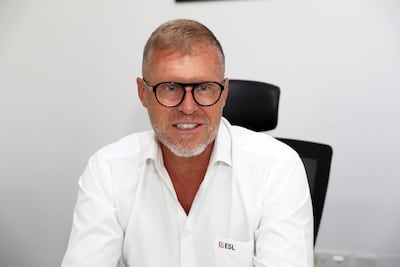A laboratory in Dubai has tested more than 300 building materials so far this year in an attempt to save lives and improve fire safety.
Founded in April last year, Emirates Safety Laboratory tests all construction materials including doors, cladding, electrical cables, paint, water sprinklers and smoke detectors before they are approved for installation in tower blocks, warehouses and villas in the emirate.
It comes after it was revealed that outdated cladding – known for accelerating the spread of fire – and faulty wiring were among the common factors contributing to building blazes in Dubai.
Experts at the government-owned lab have been conducting rigorous fire-resistant tests by simulating real-life scenarios to evaluate the performance of materials when a blaze breaks out.
“We test fire products and systems include facade and cables to relevant and mandatory national, European and international standards,” David Campbell, general manager of the lab, told The National.
“We had over 300 tests done in the first five months of the year.”
Fire testing methods
The examination process involves subjecting materials to intense heat, measuring their response to flame exposure, heat transfer and smoke.
These tests enable researchers to accurately assess the materials' ability to withstand fire and prevent its rapid spread.
“The lab's advanced capabilities and stringent testing protocols aim to ensure that construction materials used in the emirate meet the highest standards of fire safety,” said Mr Campbell.
Dubai Civil Defence last month said suppliers and contractors will be required to have products assessed at the dedicated lab before they can be used in construction.
Such tests were previously conducted only at private facilities.
By October, companies will be required to obtain a compliance certificate confirming building materials meet the UAE's safety standards.
“When you are involved in a field that has a direct impact on public safety and welfare, you need to test your product and demonstrate conformity to specific fire safety standards,” said Mr Campbell.

The testing of cladding was particularly important, he said.
“Inside the lab we usually demonstrate a fire that starts inside a building, breaks out of the window and reaches the exterior. The test is used to determine if the cladding facade will resist the fire and prevent the spread of flames,” Mr Campbell said.
He said the standard for meeting safety regulations in Dubai, as well as internationally, is that flames should not reach 3 metres above the window's top or 1.5 metres laterally from the window's centreline.
The 30-minute test also requires temperatures to not exceed 537°C at those distances, or in any wall cavity space.
“We work with Dubai Civil Defence to make the emirate one of the safest cities in the world,” Mr Campbell said.
New safety rules
Aluminium composite panel cladding was prohibited in the Emirates under the country's Fire and Life Safety Code of Practice, introduced in January 2017.
New buildings must be fitted with advanced non-combustible cladding that can stop the spread of flames and is more durable under intense heat.
The 35-storey 8 Boulevard Walk in Downtown Dubai was the latest high-rise to be hit by a fire in November last year, with much of the exterior cladding on one corner of the building severely damaged.
To prevent contractors or suppliers from getting around the fire safety requirements, the lab plans to use fingerprinting software to identify tested materials.
Fingerprinting is a broad-spectrum chemical analysis which uses a collection of instrumental and analytical techniques to provide a complete characterisation, or fingerprint, of a material.
After testing all materials, the lab will store the information on a database for all of Dubai's cladding, doors, roofing and ducts for buildings, to ensure no building products are missed.
“In the future, if the Civil Defence inspectors find something a little bit questionable, then they can send it back to us so we can match the fingerprints so we know if it's the same product we tested,” said Mr Campbell.






